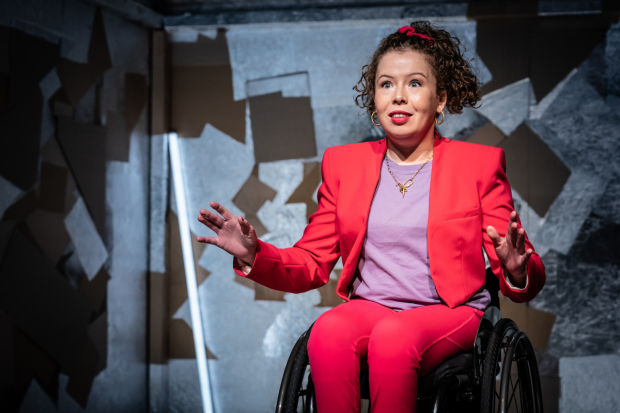Amy Trigg: ”Reasons You Should(n’t) Love Me” started because I wanted more control over the stories I told

© Marc Brenner
I graduated from drama school in 2013 and found myself in an industry that didn’t seem quite ready for disabled actors. There were few disabled roles up for grabs, and there was a resistance to cast disabled actors in non-disabled roles. I found myself in a sticky position…should I retrain in cyber? Then I figured I’d just create the roles myself. I started taking improv and sketch classes. I played reindeers and supermodels and CEO’s – it was joyful, and I quickly became incredibly nerdy about the whole thing. One night, for no other reason than I fancied trying something new and scary, I decided to enter a stand-up competition. I performed a five-minute one woman sketch and I loved it. This, I believe, is where Reasons You Should(n’t) Love Me truly started.
I didn’t do stand up for too long – acting work had picked up (shout out to my agent, Lee, who didn’t stop knocking on doors), so I didn’t have time to work on stand-up sets. No one told me how much time and loneliness was involved in stand-up. Side note: If you know a stand-up comedian then please give them a hug…and a cuppa…and offer to drive them to dinner – they do too much driving. Anyway, my short-lived stand-up career led to me making speeches on diversity and inclusion, which then led to me writing an essay for the book Feminists Don’t Wear Pink (and other lies).
By this point I was wondering if I could create something longer than an essay, sketch, or five-minute stand-up set. Something more lasting than an improv show. So, I started writing every night after work. I wrote dozens of essays around various themes including street healers, platonic love, and first kisses. I reworked old stand-up material and searched my laptop for forgotten sketches. I even found a poem I wrote when I was six! If any part of my life was going to be a montage, this would be it (complete with cheesy 80’s music and Windows Movie Maker transitions). All this writing slowly morphed into a monologue, which eventually became my debut play Reasons You Should(n’t) Love Me. I’d written a play! Yay. Now what?
I was scared about sharing Reasons. I’m often asked if the play is autobiographical, and the answer isn’t simple…the story is fictional and so are the characters. But there’s a lot of me and my life in there. I felt vulnerable! What if people hated it? Did that mean they hated me? Should I just run away and never mention this secret play to anyone ever again? Naaaaah, YOLO. I shared a 20-minute extract with a lovely group of friends, and they encouraged me to send it off to competitions and schemes. It. Was. Terrifying. But what did I have to lose?
The play got me onto various schemes, including BBC Drama Room, BBC Writer’s Access Group, 4Screenwriting, TV Drama Writer’s Programme and Royal Court Introduction to Playwriting. I got lucky. And I know that I worked hard for it. But I will always be aware of how lucky I am to have written this play at this time. A time when there is more space for disabled actors and writers. Because I bet you that in 2013, when I was struggling to find my place in the industry, there was a disabled actor/writer with a similar play. And maybe it didn’t get the support it needed. That sucks. And it’s why I’m so grateful for our changing industry, the wonderful humans leading that change, and of course…the Women’s Prize for Playwriting.
Winning the inaugural Women’s Prize for Playwriting was a bit of a shock. I didn’t consider myself to be a writer – I was an actor who sometimes wrote. But winning the prize gave me the confidence and opportunity to call myself an actual writer. How grown up! After the prize, the play was produced quicker than I anticipated. Our first run at the Kiln Theatre was amidst COVID but we sold out (whaaaat!) and we’re absolutely buzzing to be bringing the play back a year later – and this time on tour!
Reasons You Should(n’t) Love Me started because I wanted more control over the characters I played and the stories I told. I’m so grateful for where it’s led me. It sounds cliché…but the play, the prize and the production have changed my life. I wish I could jump in a time machine and tell 2013 Amy what’s to come. Or tell six year-old Amy that her poem is in a play. But I know about the risks of time travel, and I’d rather not create a black hole or whatever. Better to focus on the now, eh?












